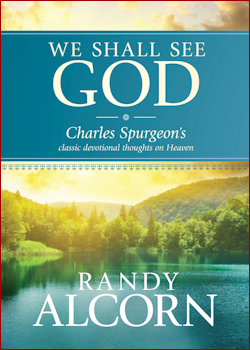
 'm not generally a fan of daily devotionals. The readings tend to be like bite-size shortbread biscuits—a verse or two of Scripture appended to a paragraph with a corny anecdote. My appetite runs more to things like rare steak, 9 ounces or more. So when I'm reading devotionally (devoting time to God, and listening to Him), my preference is to read straight Scripture, at least a chapter or two at a time, without prefabricated what-do-you-think-about this-style questions, thoughts-of-the-day, fortune-cookie quotes, cutsie human-interest stories, or any of the other standard daily-devotional gimmicks.
'm not generally a fan of daily devotionals. The readings tend to be like bite-size shortbread biscuits—a verse or two of Scripture appended to a paragraph with a corny anecdote. My appetite runs more to things like rare steak, 9 ounces or more. So when I'm reading devotionally (devoting time to God, and listening to Him), my preference is to read straight Scripture, at least a chapter or two at a time, without prefabricated what-do-you-think-about this-style questions, thoughts-of-the-day, fortune-cookie quotes, cutsie human-interest stories, or any of the other standard daily-devotional gimmicks.Don't get me wrong: I have nothing against commentaries and study tools, and I use them profusely when I'm studying a text I intend to write or preach on. But when I'm doing purely devotional reading, I prefer to devote all my time and attention to the text itself, so I can hear God's Word without interruption and meditate on it.
 Nevertheless, I very much like We Shall See God, a new devotional book on heaven and the afterlife by Randy Alcorn, with copious quotes from C. H. Spurgeon. It is meaty, rich with insight, engrossing, and fresh (even though the Spurgeon excerpts are more than a century old).
Nevertheless, I very much like We Shall See God, a new devotional book on heaven and the afterlife by Randy Alcorn, with copious quotes from C. H. Spurgeon. It is meaty, rich with insight, engrossing, and fresh (even though the Spurgeon excerpts are more than a century old).As a matter of fact, for my money, it's an even better book about heaven than Alcorn's original bestselling book on the subject.
Alcorn has lightly edited the Spurgeon material to make it more easily readable, and he has done a superb job choosing and reformatting these excerpts. Gone are the three-page-long paragraphs you have to slog through in the sermon volumes. Spelling, punctuation, and some words have been Americanized. Paragraphs have been omitted here and there where it helps to make Spurgeon's point in a more focused way. The editing has been done with proper respect to the material, and without any attempt to alter the sense or substance of what Spurgeon originally said. (Alcorn explains the editing process in his introduction.)
You may very well want to use this book as a daily devotional, and it is plenty nutritious enough for that. Spurgeon's premillennialism comes through wonderfully where he discusses eschatology. Spurgeon's portrayal of heaven is superbly biblical and devoid of speculation. There are also chapters on the reality of God's wrath and the horrors of hell, so this is no syrupy book that might give artificial comfort or false hope to the lost.
I think it is a fine book expounding on what the Bible says about the afterlife, and even if you don't use it as a devotional guide, you will find it a good read. It's going in the doctrinal section of my library, not on that top, out-of-reach shelf where I store most of my devotional books.












20 comments:
Hi Phil,
Thanks for the post. Genuine question, though slightly tangential so it may fall foul of the comment rules. I was reading Acts 15 and wondered are Christians free to eat the rare steak of your post?
Thanks, Matt
The releveant part is:
For it has seemed good to the Holy Spirit and to us to lay on you no greater burden than these requirements: that you abstain from what has been sacrificed to idols, and from blood, and from what has been strangled, and from sexual immorality.
Thank you for the book review, Phil. I may be forced to get a copy now.
Please forgive me for participating in the following side-meta...
@ undercovertheologian,
Try Genesis 9:3-4. My understanding is that this was to prevent diseases in the post-flood world (in other words, slaughter an animal by "bleeding it," and then cook it--this was God's gracious provision of protection in a world that hadn't eaten meat, yet... and God's omniscience is on display thousands of years before we knew about microbes)... and pagan man refused to follow even this simple rule of God's and incorporated blood-drinking in idolatrous rituals that were familiar to the gentiles of Paul's day. Enjoying a properly butchered and safely-handled rare-cooked steak is different than indiscriminately eating raw meat, or participating in pagan rituals.
Hmmmm, maybe I'll grill tonight.
For some reason I thought Spurgeon was Post-Millenial. Or is it one of those doctrines that is co-opted by all sides the way both Calvinists & Arminians use Spurgeon claiming them as their own?
In any case, I agree with your opinion of devotionals. I've never really stuck to a devotional book with pithy "word of the day" comments. I usually will use any theological book I'm currently reading or just the Bible itself, and use whatever study I'm doing.
Thanks for the devotional review, Phil, that sounds like a good devotional book. Yes, the typical devotionals have too much fluff, anecdotes and "think about it" questions. One devotional I do like, Days of Praise from Institute for Creation Research: it takes a verse of scripture but then does a small teaching session with references to the Greek technical words as well as to many other scripture verses.
Thanks for the review. That was a superbly written review by the way. Enjoyed reading it.
I usually read the Valley of Vision for my devotional, and Scripture, of course. Yet, I also like devotionals, and may pick this one up. Thanks again.
BTW: If any one has a few seconds, could they pray for me. I seem to have lost some of memory. Thanks.
Just purchased a Kindle version for my iPad and am looking forward to reading it. Living in today's sinful society makes me long even more for my redemption in Jesus Christ. Even so, Lord Jesus, quickly come!
Bought it, thanks for the heads up.
Thanks for this! I was already debating getting this - I love Alcorn's "Heaven" - but this post settled it for me. Going in my next Amazon cart.
Thank you so much for the recommendation, I will have to pick it up. I am not much into devotionals either, but I enjoy reading TableTalk, which is put out by R.C. Sproul. It is meaty and isn't full of the syrupy stories you find in other devotionals.
Pierre, Spurgeon was NOT the same kind of pre-millennialist that most folks of when they hear "pre-millennial" today. He is more what some folks would now call "historical pre-millennial", which is pre-mil but without the dispensationalism.
Also, we Calvinists don't claim Spurgeon for our own, but Spurgeon claimed (and demonstrated in his sermons) to be one of us. Simple historical fact. He boldly proclaimed to be an adherent to the doctrines of grace.
Spurgeon was not "dispensational" but his beliefs were actually quite similar to moderate or progressive dispensationalists, in that he held to the literal understanding of OT prophecies as speaking of the regathering of Israel -- and NOT about the church. He firmly held to the future gathering and salvation of national ethnic Israel, and even maintained that Ezekiel's temple would be a literal structure of some church significance.
I also like my primary devotional time to be a chapter or two of Scripture and time in prayer.
I like the typical devotional book at times when I just want to read. If I only have time for one or the other, I go with the Scripture reading, which is why I try to do that before I get out of bed in the morning just in case the rest of the day is full of surprises.
Thanks for the book recommendation. I've been reading through Spurgeon's sermons and while they are enjoyably meaty (not RARE, not RARE, but well done! heh, hehe), they do take some time to fully grasp.
Not that taking time and work is a bad thing, but to get it in more easily digestible form makes a grueling 5 round title fight into a one punch knockout! 8-)
You know, I was at Lifeway the other week and while in the devotional section I was really tempted to pick up a copy of "A verse or two of Scripture appended to a paragraph with a corny anecdote."
undercovertheologian: "I was reading Acts 15 and wondered are Christians free to eat the rare steak of your post?"
Yes.
undercovertheologian:
Dr. Duane Garrett of the Southern Baptist Theological Seminary argues, based on the passage you mention, that the eating of blood is yet forbidden.
@Sir Bass and Linda O:
Thanks for the pointers.
What I meant there, Sir Bass, is that in the popular Calvinist-Arminian discussion at large, both sides will appeal to some quote by Mr. Spurgeon to support their argument.
Of course, I realize Spurgeon was clearly Calvinistic.
Lol!
"without prefabricated what-do-you-think-about this-style questions, thoughts-of-the-day, fortune-cookie quotes, cutsie human-interest stories, or any of the other standard daily-devotional gimmicks." So true!
Thank you for the book recommendation Pastor Phil. Will have to put a mental check on that to check out the book.
RE: Spurgeon the Calvinist
Just note that Pastor Spurgeon wrote a Book on the topic;
A Defence of Calvinism (Of the Historical type as written and taight by Jean Cauvin);
and
there is another relating to his stance on the topic against "exclusivism";
Spurgeon v, Hyper-Calvinism (Which is of course not even any true form of Cavinistic teaching ~ I would rather venture to call it rank Herecy)
I believe that Pastor Spurgeon settles that argument himself.
It is also noteworthy that his Downgrade Controversy with the Baptist Union (Which also still boasts an affiliation with him these days); was partl related to the formation and or affirmation of a Confession of Faith whch the Union could not stomach because it was of a Calvinistic/Reformed persuation ~ That being the 1689 London Baptist Confessions of Faith with some adjustment by Pastor Spurgeon.
In a simple way I understand that the Doctrines of Grace was the heart of the offence for the Baptist Union; as it is still today.
I for one am glad that the Spirit has been well pleased to enable Pastor Spurgeon to stand firm in the midst of a great storm; his faithfulness to our King has inspired me beyond my own understanding to take my stand on the same ESSENTIAL issues.
Your fellow bondslave according with the Covenant of Mercy made by our LORD, which has set us at Liberty in Messiah JESUS Alone,
W
@ ajlin - Would Dr. Duane Garrett also argue against consuming various gravies made from pan-drippings (e.g. from roasts, turkey, etc.) which are mostly composed of animal blood?
I sure hope not...!
Agreed. I got this book last week and I am enjoying it very much; it has been comforting to read about Heaven after the death of my infant niece last week.
The Lord is good!
Post a Comment